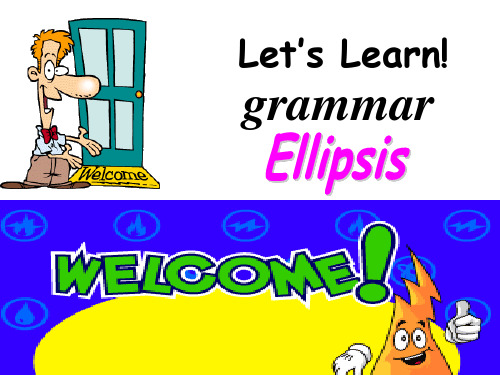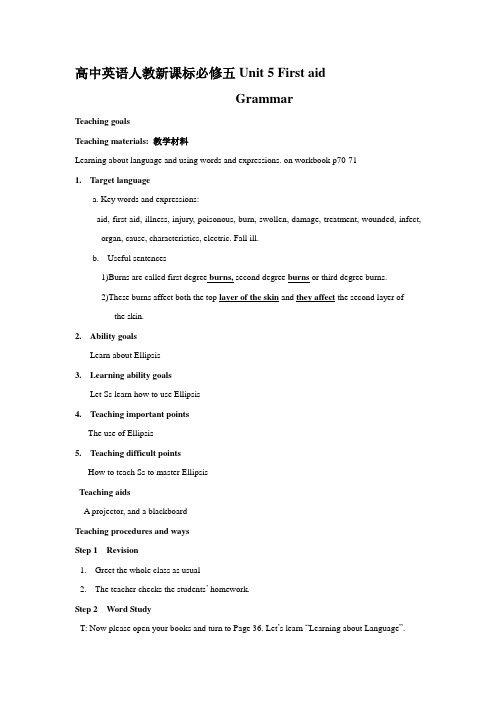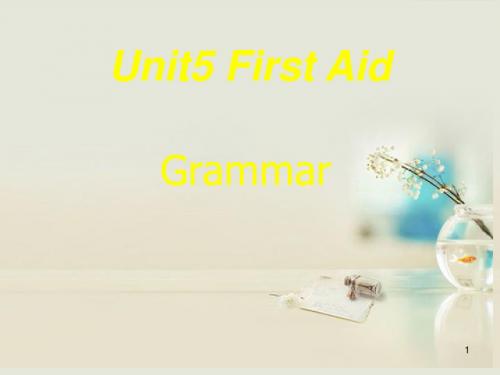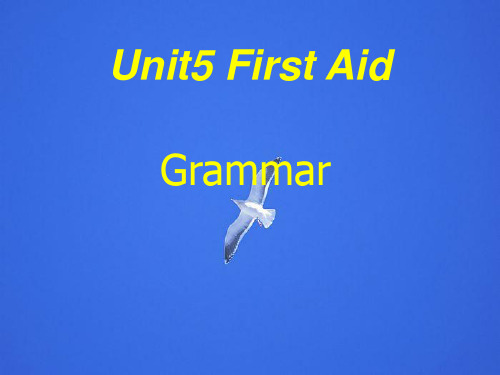必修5 Unit 5 First Aid-Grammar ellipsis省略
- 格式:doc
- 大小:272.00 KB
- 文档页数:11


高中英语人教新课标必修五Unit 5 First aidGrammarTeaching goalsTeaching materials: 教学材料Learning about language and using words and expressions. on workbook p70-711.Target languagea. Key words and expressions:aid, first aid, illness, injury, poisonous, burn, swollen, damage, treatment, wounded, infect, organ, cause, characteristics, electric. Fall ill.eful sentences1)Burns are called first degree burns, second degree burns or third degree burns.2)These burns affect both the top layer of the skin and they affect the second layer ofthe skin.2.Ability goalsLearn about Ellipsis3.Learning ability goalsLet Ss learn how to use Ellipsis4. Teaching important pointsThe use of Ellipsis5. Teaching difficult pointsHow to teach Ss to master EllipsisTeaching aidsA projector, and a blackboardTeaching procedures and waysStep 1 Revision1.Greet the whole class as usual2.The teacher checks the students’ homework.Step 2 Word StudyT: Now please open your books and turn to Page 36. Let’s learn “Learning about Language”.First let’s do Discovering useful words and expressionsplete the table with the correct verbs, nouns or adjectives.T: Let’s do some more exercises about new words. You are to explain the words on the screen in English and then fill in the blanks.(ask students to explain or guess the meanings of the words)plete the questions with words from the text.The students will try to complete the exercises. Later the teacher will ask some of them to read each of the sentences and tell the class the answers.Suggested answers:Step 3: GrammarT: Let’s look at the next, Grammar (page 91)Present some sentences and encourage the students to find out which words have been left out. T: Observe the following sentences and discuss with your partner to find out what have been left out. Let me show you an example. As we know, when people want the speaker to repeat what he said, they usually say “ Beg your pardon.” Then it is called Ellipsis. The subject “I” has been left out, without changing the meaning of the sentence .OK, now it’s your turn to find out what have been left out.1.Haven’t seen you for ages.2.Some more tea?3.Sounds like a good idea.4.Doesn’t matter.5.Sorry to hear that.6.Pity you couldn’t come7.This way, please.8.Terrible weather!9.Joining us for a drink?10.Going to the supermarket?Suggested answers:1.I haven’t seen you for ages.2.Would you like some more tea?3.That/It sounds like a good idea.4.It doesn’t matter.5.I’m sorry to hear that.6.It’s/ What pity you couldn’t come7.Step this way, please.8.What terrible weather it is!9.Are you joining us for a drink?10.Are you going to the supermarket?Step 4 PractisingDiscovering useful structures (page 37)1.In groups, look at these pairs of sentences. Discuss the difference between A and B ineach pair. Also discuss which is the better sentence, A or B and Why.(page 37)2.Rewrite these sentences taking out the unnecessary parts.1)The burn that she got from the iron was red and ( it was )very painful2) A boy was on the left side of the sick woman, and a girl was on the right (side ofthe sick woman.)3)She has a daughter (who is) in hospital.4)He went to the doctor because he had to go to( the doctor).5)Did she pass the first aid test that she did yesterday (or didn’t she pass)?6)She could not decide whether to send him to hospital or not (to send him tohospital).7)When your nose is bleeding, you should bend forward so that the blood runs out ofyour nose and( the blood) doesn’t run down your throat.8)Only some of the students have done a first aid course but most of the studentshaven’t (done a first aid course).3.These sentences are correct. However, one or more words have been left out. Rewriteeach sentence on the top of the next page to include the missing words.1)The cottage (that is) surrounded by a wall belongs to the local government.2)The first book I read this term was more interesting than the second (book I readthis term).3)To her teacher’s surprise, she did better in her first aid exam than(it was) expected.4)I don’t think they have returned from the hospital, but they might have ( returnedfrom the hospital).5)He wanted to help the accident victim but his friend didn’t (want to help theaccident victim).6)You can borrow my first aid notes if you want to (borrow my first aid notes).4.Show the students the slides with some multiple choices exercises about the Ellipsis.1)---- Tomorrow is a holiday. Why are you doing your homework?-----I am doing these exercises now so that I won’t have _____ on Sunday.A. itB. themC. forD. to2)----Shall I invite Ann to my birthday party tomorrow evening?----Yes. It’ll be fine if you______.A. areB. canC. inviteD. do3)---- Aren’t you the manager?-----No, and I______A.don’t want toB. don’t want to beC. don’t want beD. don’t want4)---- I’ll be away on a business trip. Would you mind looking after my cat?-----Not at all______.A. not toB. not to doC. not do itD. do not to5)----- Won’t you have another try?------ ________.A.Yes, I will haveB. Yes, I won’t haveC. Yes, I won’tD. Yes, I will6)-----I won’t do it any more.-----_______?A. Why notB. Why don’t do any moreC. Why not doD. Why don’t7)-----Do you think it will snow tomorrow?------______?A.I don’t thinkB. No, I don’t thinkC. I don’t think soD. No, I don’t so8)-----Have you fed the cat?------No, but______.A. I’mB. I amC. I’m just goingD. I’m just going toStep 5 Homework1. Go over the usage of Ellipsis.2. Finish listing structures on Page 71 Ex 1 and Ex 23. Prepare Reading and discussing on Page 38。

Period Four Grammar—Ellipsis感知以下课文原句,补全方框下的小题1.句1和句4为简单句中的省略,句1中在first和second后省略了degree;句4中在becoming 前省略了from。
2.句2,3和5为状语从句的省略。
当状语从句的主语和主句的主语一致,或当状语从句的主语为it,而且从句谓语中含有be动词时,可以把从句的主语和be动词一起省略。
一、什么是省略1.省略是一种避免重复、保持简洁的语法手段。
2.凡是缺少一个或一个以上的必要语言成分,但在一定语境中能够独立存在,意义明确,并且能发挥交际功能的句子就是省略句。
二、省略的分类(一)简单句中的省略1.省略主语:一般情况下,主语是不能省略的,但在祈使句和其他不容易引起歧义的情况下,特别是在口语中,常常省略主语,主要是祈使句中的you和疑问句中的主语。
(You) Shutup!住嘴!(It) Doesn’tmatter.没关系。
2.省略宾语:当上、下或前、后两个句子的宾语一致时,下句或后句常省略宾语。
—DoyouknowMissGao?—Idon’tknow (her).——你认识高女士吗?——不认识。
3.省略主语和谓语(或谓语的一部分):在某些具体的场合下,主语和谓语都很明确,此时为了简化或显得亲切等,可将主语和谓语(或谓语的一部分)同时省略,只剩下表语、宾语、状语或其他成分。
(Youcome) Thisway,please.请这边走。
(省略了主语和谓语)(Haveyou) Gotanyink?你有墨水吗?(省略了主语和谓语的一部分)(二)并列句中的省略一般来说,在后一并列句中凡是与上文相同的成分通常都要省略。
Myroomisonthefifthfloor,andhers (is) ontheeighth (floor).我的房间在五楼,而她的在八楼。
(三)复合句中的省略1.状语从句中的省略当状语从句的主语和主句的主语一致或从句的主语为it,且从句谓语中含有be动词时,省略状语从句中的主语和be动词。



年级高二学科英语版本人教新课标版课程标题必修5 Unit 5 First Aid-Grammar ellipsis省略编稿老师冯振宇一校黄楠二校李秀卿审核刘晓军一、学习目标:1. 学习省略句,掌握其特点2. 学会使用省略句使自己的语言表达更生动,且能够解答与这一语法相关的习题。
二、重点、难点:掌握倒装句的标志词三、考情分析:1. 倒装句是每年高考考查的重点内容,是单项选择题的考查项目之一,分值为1分。
2. 与倒装有关的特殊句式也是高考考查的重点。
四、知能提升:(一)知识讲解【认知讲解】●教材原句呈现If possible, discuss what kind of first aid you should give in these situations.Turn white when pressed.Remove clothing using scissors if necessary unless it is stuck to the burn.●对比分析第一个句子,if后面省略了it is,第二个句子中的when后面省略了they are,而they指的是前面的burns。
第三个句子if后省略了it is。
【重、难点】为了避免重复,或为了使句子更简练,在一些句子中常省去某些成分,这在英语中叫作省略。
省略可出现在简单句、并列复合句和主从复合句中,省略部分可以是主语、谓语、表语、状语、定语等。
1. 并列复合句中某些相同成分的省略。
This cell phone works well,but that one doesn‟t(work well).这个手机工作正常,但那个就不行。
There are many people in the room, some of them are reading, some chatting and others just sitting there doing nothing.房间里有许多人,有的在读书,有的在闲聊,还有的坐在那里无所事事。
【考题链接】One of the sides of the board should be painted yellow, and ________.A. the other is whiteB. another whiteC. the other whiteD. another is white答案:C解析:这里的省略是承前省略。
完整的句子为the other side of the board should be painted white。
2. 在when,while,if,as if,though(或although),as,until,once,whether,unless,where等连词连接的状语从句中,常省略跟主句相同的主语和be动词。
When (water is) pure,water is a colorless liquid. 水在纯净时,是无色的液体。
When (I am) in trouble,I always turn to her for help. 我有困难时总是找她帮忙。
Errors,if any,should be corrected.如果有什么错误,就应当改正。
(if后省略了there are)Wood gives much smoke while (wood is) burning. 木头燃烧时,放出很多烟。
The letter is to be left here until (it is) called for. 这封信留在这里待领。
Henry walked around as if (he were) looking for something.亨利四处走动,似乎在寻找什么。
She studies very hard though (she is) still rather weak.她虽然体弱,但学习仍十分努力。
【考题链接】1)The experiment shows that proper amounts of exercise, if __ regularly, can improve our health.A. being carried outB. carrying outC. carried outD. to carry out答案:C解析:原句部分可变形为if proper amounts of exercise are carried out 句意:这个实验表明,如果运动量有规律地进行的话,合理的运动量可以促进我们的健康。
2)The school rules state that no child shall be allowed out of the school during the day, ______ accompanied by an adult.A. onceB. whenC. ifD. unless答案:D解析:句意为“校规规定:除非有成年人陪同,否则孩子们在校期间不能出学校。
”表示“除非”的意思时用unless。
该句式构成了“连词+过去分词”结构,相当于一个状语从句“unless they are accompanied by an adult”。
3. 当见到“when(或if where,wherever,whenever,as soon as,as fast as,than等)+possible/necessary”等时,可理解为中间省略了it is(或was)。
I will be back as soon as possible. 我会尽可能快的回来。
When (it is) necessary you can help us to do something. 必要时你可以帮助我们做些事。
4. 有形式主语it的主语从句可省略that。
It is an honor (that) I was invited to your birthday party.我很荣幸地被邀请参加你的生日聚会。
It‟s a pity (that) you can‟t operate a computer. 很遗憾,你不会操作计算机。
It is the third time (that) I have come to China. 这是我第三次来中国。
5. 在限制性定语从句中可省略作宾语的关系代词whom,which,that。
That is the book (that) we talked about last week.那就是我们上周讨论的那本书。
【考题链接】Do you still remember the chicken farm ______ we visited three months ago?A. whereB. whenC. /D. what答案:C解析:visit为及物动词,所以引导定语从句的应该为关系代词that或which,且可以省略。
6. 在direction(方向),way(方式),distance(距离),time(时间),times(倍数)等词后面所接的定语从句中常省略that, which, in which。
The direction (in which) we move a body can be changed.我们可以改变移动物体的方向。
The distance (which/that) light travels in one second is 300, 000 kilometers.光每秒走的距离是30万公里。
【考题链接】The way he did it was different from what we were used to.A. in thatB. in whatC. /D. with which答案:C解析:此题解题的关键在于牢记way后面的定语从句的引导词有三种形式:that, in which 或者省略,什么也不用。
7. 命令句、感叹句、部分第一人称的陈述句、部分问句和答句中的省略最为常见。
Open the door! 开门!!Why not? 为什么不?Why so? 为什么这样?What a lovely day! 天气真不错!8. 用so、not或其他方式来省略上文或问句中的一部分或整个句子,是高考的常考项目。
—Can Emily do this work? 埃米莉能做这份工作吗?—I think so. 我想她能。
—I think not (或I don‟t think so). 我想她不能。
—Did you know anything about it? 你以前知道这件事吗?—Not until you told me. 你告诉了我,我才知道。
He has gone. No one knows where (he has gone). 他走了。
谁也不知道他去什么地方了。
Jenny knows what (is to be done)! 詹妮知道该怎么做!【考题链接】1)—Everybody is going to climb the mountain. Can I go too, mom?—______ Wait till you are old enough, dear.A. Will you?B. Why not?C. I hope so.D. I‟m afraid not.答案:D提建议,I hope so意为“我也希望是这样”,I am afraid not意为“恐怕不行”,根据句意选择D项。
句意:—每个人都要去爬山。
我也能去吗,妈妈?—恐怕不行,亲爱的,等你再长大些吧。
2)—What‟s the noise? It sounds as if it comes from upstairs.—______. It must be the window-cleaner working, next door.A. I‟m not sureB. I hope notC. I‟d rather notD. I don‟t think so答案:D解析:A项意思是:我不确信;B项意思是:我希望不会;C项意思是:我宁愿不;D 项意思是:我认为不会。
根据应答句后面分句的意思可知所填部分表示对前一人的观点的否定,故选D项。
9. 用to表示前述动词(包括谓语或非谓语动词)及其短语。
这些动词有:expect,want,hope,like,mean,refuse等。
Some people suggested that she reconsider the matter,but she refused to (reconsider the matter). 有些人建议她重新考虑此事,但是她拒绝了。